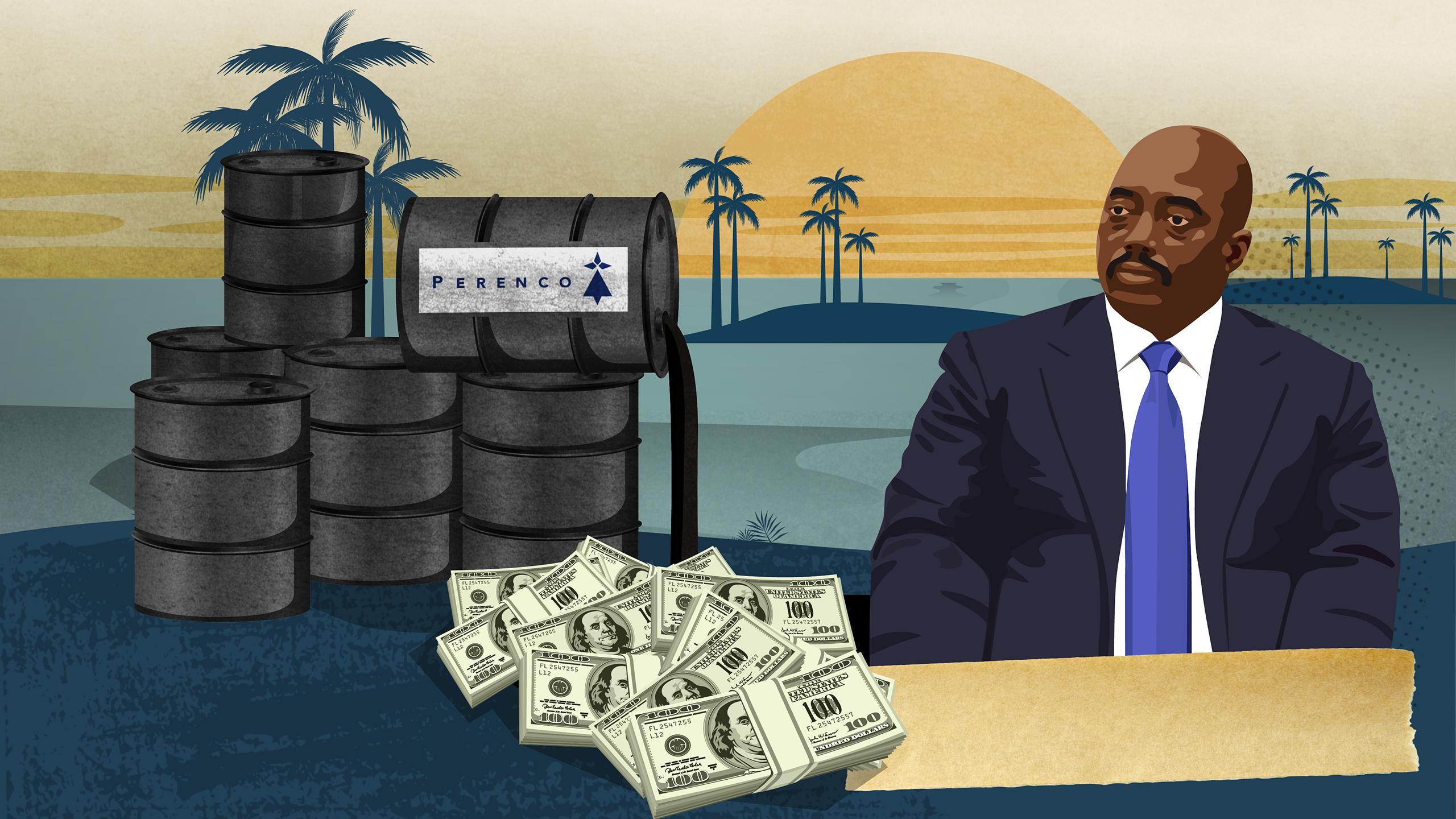
20 July 2023 Leïla Miñano
Leïla Miñano Maxence Peigné
Maxence Peigné Yann Philippin
Yann Philippin
Oil giant Perenco’s suspicious deals with companies close to Congo’s ex-president

Alexia Barakou
Oil giant Perenco’s suspicious deals with companies close to Congo’s ex-president
20 July 2023Investigate Europe and Mediapart can reveal how energy firm Perenco paid over $1 million to companies close to former Congolese president Joseph Kabila. These transactions, listed in the "Congo hold-up" leak from African bank BGFI, raise collusion concerns about Europe's main independent oil company and Kabila's business partners already at the heart of various probes.
Congolese businessman Nicolas Wan likes to post pictures on social media of Mateba, a lush island the size of Paris, nestled where the Congo River meets the Atlantic Ocean. In one photo from April 2020, the young man contemplates the tranquil waters turned orange by a glowing sun. “My favourite place on earth”, reads the caption written by the son of Alain Wan, a construction tycoon linked to several alleged embezzlement scandals involving Joseph Kabila, the former president of the Democratic Republic of Congo.
The Wans once owned Mateba but sold it to Kabila in 2010. Since then, it has become a personal playground for the man who ruled DRC for almost two decades until 2019 and built a fortune worth hundreds of millions of euros. In 2017, it was revealed how Kabila had 450 zebras, buffaloes, giraffes and other wild animals shipped from Namibia to the island, with the help of Alain Wan.
The Wans once owned Mateba but sold it to Kabila in 2010. Since then, it has become a personal playground for the man who ruled DRC for almost two decades until 2019 and built a fortune worth hundreds of millions of euros. In 2017, it was revealed how Kabila had 450 zebras, buffaloes, giraffes and other wild animals shipped from Namibia to the island, with the help of Alain Wan.
_Instagram%20Nicolas%20Wan_Credit%20Louis%20Riga.jpg&w=3840&q=75)
Mateba Island has become a personal playground for former Congolese president Joseph Kabila.Instagram
But Mateba isn’t just home to exotic wildlife, it has also been the registered address of a mysterious company incorporated by the Wan family: Etablissement Kuntuala (ETS Kuntuala). This firm shares a bank account with another opaque entity, Kuntuala Mining SAS. The first transfer the account ever received, according to internal bank documents, came from the Franco-British oil company Perenco in February 2015, for a total of $272,914.
Investigate Europe and Mediapart have uncovered 14 money transfers made by Perenco’s Congolese subsidiaries between 2014 and 2015 to firms close to Joseph Kabila. The transactions, totalling $1.3 million, were listed in a treasure trove of financial records leaked from pan-African bank BGFI. Obtained by Mediapart and the NGO Platform to Protect Whistleblowers in Africa (PPLAAF) and published in November 2021, the “Congo Hold-up” documents exposed how Kabila and his associates allegedly misappropriated millions of euros of public funds. It sparked police investigations in Congo, France and Belgium.
In a statement, Perenco denied any wrongdoing and said that no payments were made to ETS Kuntuala. BGFI did not respond to requests for comment.
Investigate Europe and Mediapart have uncovered 14 money transfers made by Perenco’s Congolese subsidiaries between 2014 and 2015 to firms close to Joseph Kabila. The transactions, totalling $1.3 million, were listed in a treasure trove of financial records leaked from pan-African bank BGFI. Obtained by Mediapart and the NGO Platform to Protect Whistleblowers in Africa (PPLAAF) and published in November 2021, the “Congo Hold-up” documents exposed how Kabila and his associates allegedly misappropriated millions of euros of public funds. It sparked police investigations in Congo, France and Belgium.
In a statement, Perenco denied any wrongdoing and said that no payments were made to ETS Kuntuala. BGFI did not respond to requests for comment.
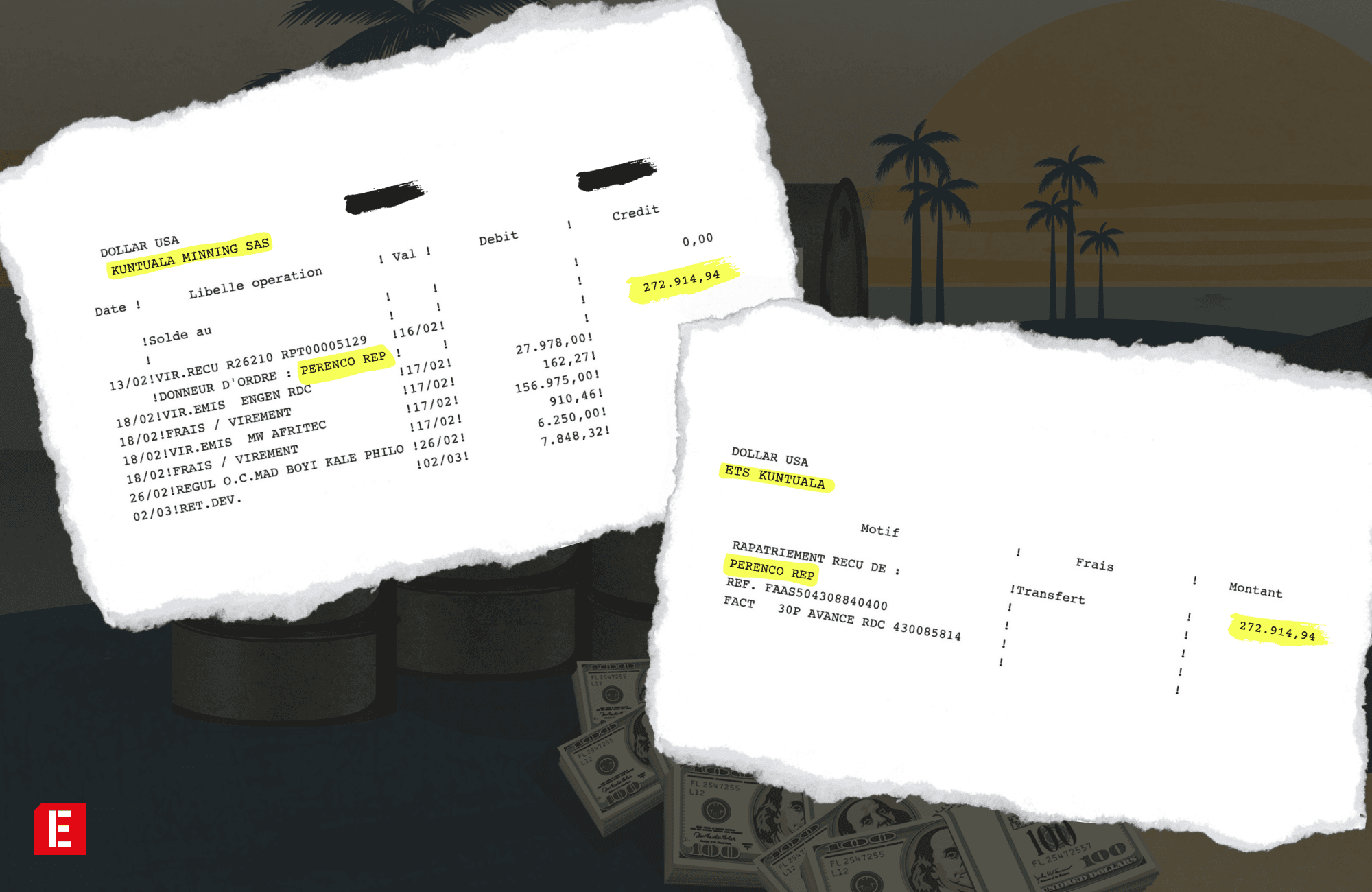
Leaked BGFI documents detail a Perenco transfer made to ETS Kuntuala.Investigate Europe
The revelations concerning Perenco, published here for the first time, put renewed scrutiny on Europe’s largest independent oil producer, already mired in allegations of wrongdoing in DRC and across Africa. In November 2022, Investigate Europe and partner revealed 167 reports of pollution linked to the company, which is Congo’s only oil producer (NGOs Sherpa and Friends of the Earth later filed a complaint against Perenco in France for environmental damage). In March 2023, it emerged that French police are investigating Perenco for corruption in several unspecified African countries.
DRC remains one of the world’s five poorest nations, yet it has become a land of plenty for Perenco since it bought ageing oil fields on and off the country’s coast in the early 2000s. For its offshore permits alone, the group declared revenues of $196 million in 2021, according to corporate documents filed in Guernsey, a tax haven where some of its holdings are registered.
In the Congo Hold-up leak, Perenco doesn’t appear as a client of BGFI, whose Congolese subsidiary until 2018 was run by Joseph Kabila’s adoptive brother. However, Perenco’s name pops up in the accounts of other BGFI clients who received money from the oil company. Among them is the recipient of the $272,914 transfer, ETS Kuntuala, a company controlled by Alain Wan and his mother, according to a leaked bank document from 2016.
The links between the Wans and the former Congolese president have been well documented. Alain Wan, the patriarch of the family business, is one of Kabila’s closest associates. With his childhood friend, Marc Piedboeuf, Wan incorporated a myriad of companies in DRC and in several tax havens, some of which have carried out operations worth tens of millions of dollars for the benefit of the Kabilas, according to reports.
Wan and Piedboeuf set up Grands Elevages du Bas-Congo (GEL), the company that owns Mateba Island and which was bought by the President via his personal holding company (Piedboeuf appeared as a director there as early as 2014). The pair also created Port de Fisher, sold to Kabila at the end of 2015. They were also shareholders and directors of EGAL, a firm at the heart of an alleged embezzlement scam of $43 million revealed in 2016 by Jean-Jacques Lumumba, a former BGFI employee turned whistleblower.
DRC remains one of the world’s five poorest nations, yet it has become a land of plenty for Perenco since it bought ageing oil fields on and off the country’s coast in the early 2000s. For its offshore permits alone, the group declared revenues of $196 million in 2021, according to corporate documents filed in Guernsey, a tax haven where some of its holdings are registered.
In the Congo Hold-up leak, Perenco doesn’t appear as a client of BGFI, whose Congolese subsidiary until 2018 was run by Joseph Kabila’s adoptive brother. However, Perenco’s name pops up in the accounts of other BGFI clients who received money from the oil company. Among them is the recipient of the $272,914 transfer, ETS Kuntuala, a company controlled by Alain Wan and his mother, according to a leaked bank document from 2016.
The links between the Wans and the former Congolese president have been well documented. Alain Wan, the patriarch of the family business, is one of Kabila’s closest associates. With his childhood friend, Marc Piedboeuf, Wan incorporated a myriad of companies in DRC and in several tax havens, some of which have carried out operations worth tens of millions of dollars for the benefit of the Kabilas, according to reports.
Wan and Piedboeuf set up Grands Elevages du Bas-Congo (GEL), the company that owns Mateba Island and which was bought by the President via his personal holding company (Piedboeuf appeared as a director there as early as 2014). The pair also created Port de Fisher, sold to Kabila at the end of 2015. They were also shareholders and directors of EGAL, a firm at the heart of an alleged embezzlement scam of $43 million revealed in 2016 by Jean-Jacques Lumumba, a former BGFI employee turned whistleblower.
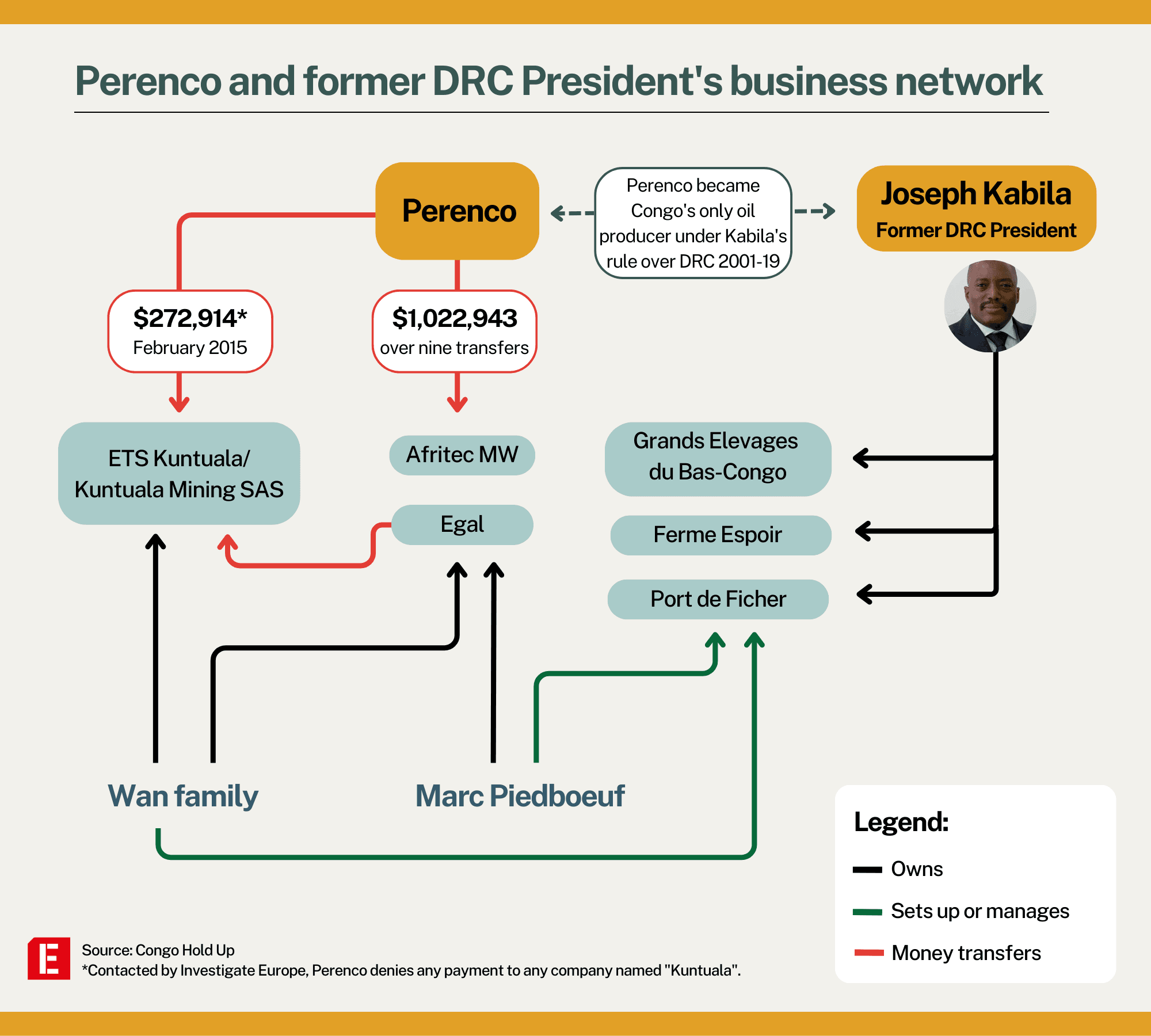
Investigate Europe
ETS Kuntuala’s registration on Mateba and the ties between Alain Wan and Kabila could have been red flags for Perenco. But there is yet another oddity that BGFI did not seem to mind. In the bank’s database, ETS Kuntuala has a second name associated with its bank account: Kuntuala Mining SAS. The first name is used for international transfers in foreign currencies. The second, for domestic transfers within DRC. An unusual practice that may prevent proper monitoring of the account’s activities.
Lumumba, who also analysed the leaked BGFI documents, suggests the Kuntuala scheme is like a “money-recycling machine”.
“It isn’t normal, this type of manipulation requires the complicity of the bank’s director of operations,” Lumumba says. “Wan and Piedboeuf have become Kabila’s henchmen in the Kongo Central region so I’m not surprised to see them working with Perenco, which is also present in this part of the country.”
While leaked BGFI files indicate ETS Kuntuala operated a shipping agency and a quarry in Boma in Kongo Central, IE could find no corporate registry documents for Kuntuala Mining SAS. However, a DRC government register lists the firm as holding a mining permit, also located in Boma and most likely linked to the quarry.
Despite being provided with all information of the bank transfer detailed in the BGFI documents, a Perenco spokesperson said: “With regards to Kuntuala, Perenco has not had a contract with this company, nor made any payments to it.” The firm refused to elaborate further when requested.
Lumumba, who also analysed the leaked BGFI documents, suggests the Kuntuala scheme is like a “money-recycling machine”.
“It isn’t normal, this type of manipulation requires the complicity of the bank’s director of operations,” Lumumba says. “Wan and Piedboeuf have become Kabila’s henchmen in the Kongo Central region so I’m not surprised to see them working with Perenco, which is also present in this part of the country.”
While leaked BGFI files indicate ETS Kuntuala operated a shipping agency and a quarry in Boma in Kongo Central, IE could find no corporate registry documents for Kuntuala Mining SAS. However, a DRC government register lists the firm as holding a mining permit, also located in Boma and most likely linked to the quarry.
Despite being provided with all information of the bank transfer detailed in the BGFI documents, a Perenco spokesperson said: “With regards to Kuntuala, Perenco has not had a contract with this company, nor made any payments to it.” The firm refused to elaborate further when requested.
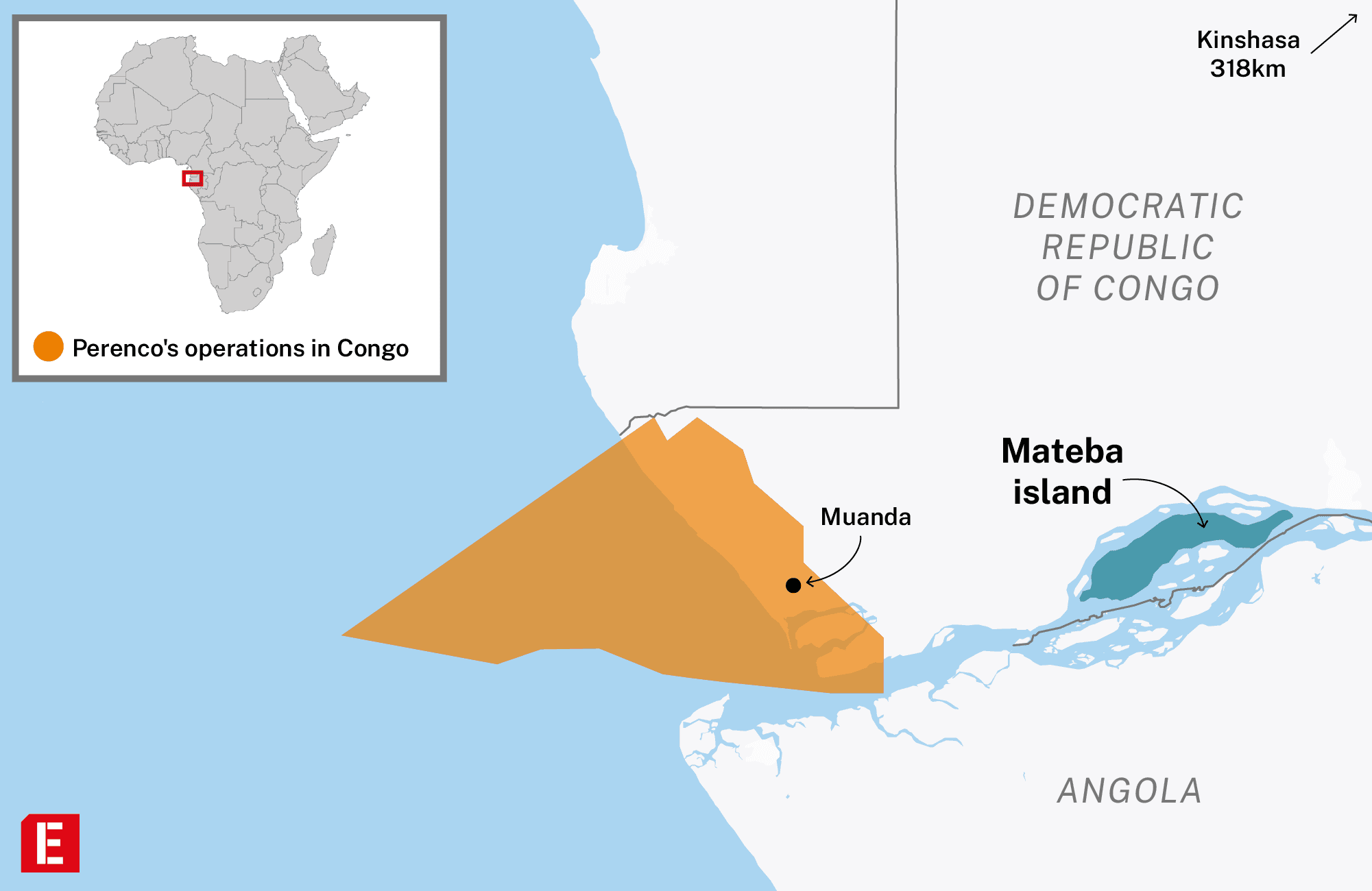
Investigate Europe
Perenco does not appear as the only benefactor of the Kuntuala network in BGFI documents. Between 2015 and 2019, the bank account was mostly funded by companies owned by Wan and Piedboeuf, by anonymous cash deposits, and by GEL, Kabila’s own firm.
The bond between ETS Kuntuala and the former president goes deeper. In 2017, the company and Alain Wan became the sole shareholders of COETE, an energy firm previously owned, among others, by GEL (10 per cent) and Kwanza SA (50 per cent), whose name resembles Kwanza Capital, Kabila’s secret investment bank, previously revealed by the American NGO The Sentry.
The leaked BGFI documents also reveal that Perenco had dealings with another company of Wan and Piedboeuf: MW Afritec, the pair’s flagship business, operating in the construction sector since 1984.
MIOC (Muanda International Oil Corporation), one of Perenco’s Congolese affiliates, sent nine transfers totalling more than $1 million to Afritec’s BGFI account between 2014 and 2015.
The bond between ETS Kuntuala and the former president goes deeper. In 2017, the company and Alain Wan became the sole shareholders of COETE, an energy firm previously owned, among others, by GEL (10 per cent) and Kwanza SA (50 per cent), whose name resembles Kwanza Capital, Kabila’s secret investment bank, previously revealed by the American NGO The Sentry.
The leaked BGFI documents also reveal that Perenco had dealings with another company of Wan and Piedboeuf: MW Afritec, the pair’s flagship business, operating in the construction sector since 1984.
MIOC (Muanda International Oil Corporation), one of Perenco’s Congolese affiliates, sent nine transfers totalling more than $1 million to Afritec’s BGFI account between 2014 and 2015.
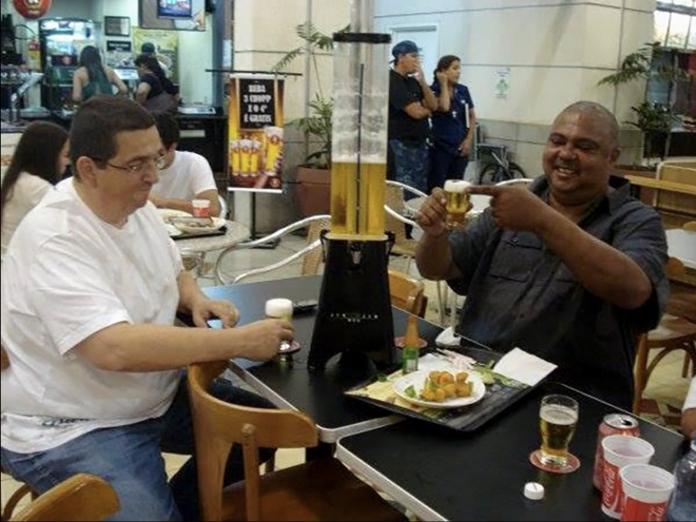
Marc Piedboeuf and Alain Wan have created a string of companies linked to Joseph Kabila.Facebook
But Afritec is not just an ordinary building firm. Its success is tied to Kabila’s power and their association started in the early 2010s, when the president “wanted to get his hands on Kongo Central”, says Lumumba. From that point, the company won a series of public tenders and received funding from the EU and the World Bank. In just seven years, its turnover multiplied by 50, estimated a banker quoted by Le Monde in 2017.
In the article, Le Monde revealed how Afritec had a discreet namesake incorporated in the Marshall Islands: Afritec MW SA. The shell company was the registered owner of a luxurious yacht called the “Enigma”, which journalists believed could be linked to Kabila. A few years later, as part of the ‘Congo Hold Up’ leak, fresh revelations showed that the boat had been refurbished with allegedly misappropriated public funds that were funneled through Port de Fisher in 2013, a company sold to Kabila two years later.
So why would Perenco pay Afritec over $1 million? According to an internal BGFI document from October 2015, the oil firm ordered crushed rocks and hired boats from Afritec that year for $910,000. Perenco, however, tells a different story.
“In 2008 Perenco agreed to a request from the local authorities to finance the reconstruction of the Muanda airstrip, which is essential infrastructure for the company’s operations, for approximately $1 million,” a spokesperson said. “The construction work was undertaken by Afritec.” Perenco added that it had a logistics contract with Afritec before 2010 and that it identified “no reference to the involvement of any officials” during its due diligence process. Neither the dates nor the purpose of the payments given by Perenco match the information held by BGFI. When pressed about these contradictions, Perenco gave no further explanation. Afritec and Alain Wan did not respond to requests for comment.
The revelations come at a busy time for the oil giant. One year ago, DRC launched a call for tenders for 30 new oil and gas blocks across the country. Perenco applied for two new permits in Kongo Central and is still waiting for the outcome of its bid. In the meantime, the hydrocarbons ministry announced on 5 July that it received four pick-up trucks from the company as a “gift”. Perenco said the cars were donated to help combat oil smuggling in Kongo Central. Greenpeace Africa denounced the donation. “Authorities are incapable of lighting the city of Muanda while Perenco has been exploiting oil in the area for decades,” the NGO said.
In the article, Le Monde revealed how Afritec had a discreet namesake incorporated in the Marshall Islands: Afritec MW SA. The shell company was the registered owner of a luxurious yacht called the “Enigma”, which journalists believed could be linked to Kabila. A few years later, as part of the ‘Congo Hold Up’ leak, fresh revelations showed that the boat had been refurbished with allegedly misappropriated public funds that were funneled through Port de Fisher in 2013, a company sold to Kabila two years later.
So why would Perenco pay Afritec over $1 million? According to an internal BGFI document from October 2015, the oil firm ordered crushed rocks and hired boats from Afritec that year for $910,000. Perenco, however, tells a different story.
“In 2008 Perenco agreed to a request from the local authorities to finance the reconstruction of the Muanda airstrip, which is essential infrastructure for the company’s operations, for approximately $1 million,” a spokesperson said. “The construction work was undertaken by Afritec.” Perenco added that it had a logistics contract with Afritec before 2010 and that it identified “no reference to the involvement of any officials” during its due diligence process. Neither the dates nor the purpose of the payments given by Perenco match the information held by BGFI. When pressed about these contradictions, Perenco gave no further explanation. Afritec and Alain Wan did not respond to requests for comment.
The revelations come at a busy time for the oil giant. One year ago, DRC launched a call for tenders for 30 new oil and gas blocks across the country. Perenco applied for two new permits in Kongo Central and is still waiting for the outcome of its bid. In the meantime, the hydrocarbons ministry announced on 5 July that it received four pick-up trucks from the company as a “gift”. Perenco said the cars were donated to help combat oil smuggling in Kongo Central. Greenpeace Africa denounced the donation. “Authorities are incapable of lighting the city of Muanda while Perenco has been exploiting oil in the area for decades,” the NGO said.
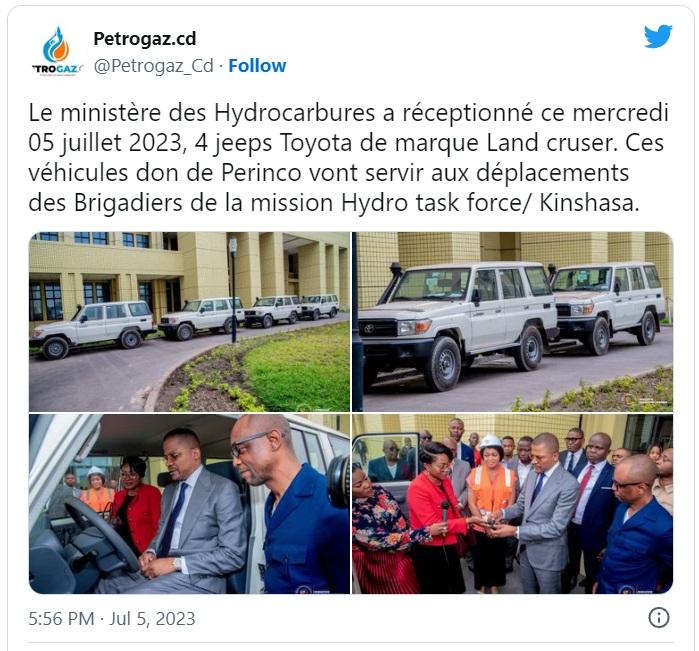
Twitter
Yann Philippin is a journalist at Mediapart.
Louis Riga contributed research to this article.
Editing: Manuel Rico, Elisa Simantke and Chris Matthews
Graphs: Marta Portocarrero
Louis Riga contributed research to this article.
Editing: Manuel Rico, Elisa Simantke and Chris Matthews
Graphs: Marta Portocarrero
